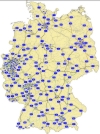 |
 |
|||||||||||||
|
|||||||||||||
|
|||||||||||||
|
All German universities and research institutes involved in the LHC and ILC have just pocketed 25 million Euros – and the prospect of a bright future at the Terascale. A DESY-driven funding proposal for the project ‘Helmholtz Alliance: Physics at the Terascale’ was approved by the senate of the Helmholtz Association on Tuesday this week. It bundles resources and expertise in German particle physics to allow scientists to play leading roles in particular in the LHC– and of course also the ILC.
Traditionally it is hard for professors at German universities to also manage groups or even whole experiments at international research labs because of the obligation to teach, a problem that will sound familiar to many fellow professors around the world. The teaching duty means you can only be at the lab for any length of time when there are no classes. With the Alliance, this will change: substitute professors take over the teaching while our scientist can concentrate on his work in the collaboration. “But the Alliance is not only for renowned oldies,” says Rolf-Dieter Heuer, research director at DESY and one of the initiators of the proposal. Young scientists will get funding for research groups and the prospect of tenure positions - an incentive to get expertise back into the country, keep it and foster researchers when they are at their most productive. All in all more than 50 positions for scientists, engineers and technicians will be created at the institutes and universities. “We also have a plan to make them truly family-friendly,” Heuer adds. And of course there's hardware. Alliance researchers can use the test facilities at DESY for detector prototypes, accelerator physicists get a new boost because the network will help them exchange, test and develop new accelerator technologies, scientists at Bonn and Heidelberg university excel in chip development and offer their expertise to everybody involved, and a new analysis centre at DESY will be a haven for software development and data analysis. All this means more efficiency, faster progress and better contributions to, for example, ILC R&D. It is the first time that institutions have come together in this way. The Helmholtz Association, DESY's funding agency, thought that it was a perfect proposal - bundling existing knowledge and expertise to take it one step further. “It is a model for a future-oriented and sustainable network of expertise. The selection committee unanimously and enthusiastically approved the proposal,” Jürgen Mlynek, President of the Helmholtz Association, says in the press release (link to press release) issued by the Alliance partners. “An enormous success,” adds Albrecht Wagner, DESY's Director General. “We are now perfectly prepared for the scientific challenges in the coming years.” The 25 million Euros will be distributed amongst the partners, with each of them contributing at least the same amount (or more) from their own funds. Funding starts on 1 July this year. The first vacancy notices will come out in the next weeks - maybe your future is at the German Terascale, too? -- Barbara Warmbein |
|||||||||||||
| © International Linear Collider |
